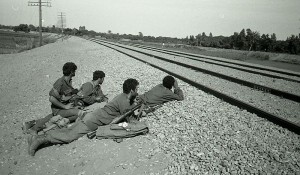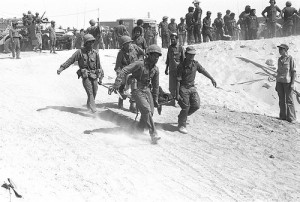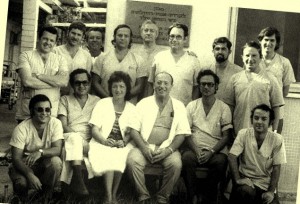We Remember: Stories from the Yom Kippur War
 On October 6, 1973, Egypt and Syria decided to launch a surprise coordinated attack upon Israel on Yom Kippur, the holiest day on the Jewish calendar. The equivalent of the entire total forces of NATO in Europe was amassed along Israel’s borders, with the intention of wiping the Jewish state out of existence. At least nine other Arab states actively aided the Egyptian and Syrian war effort. Israel was completely unprepared and Israelis paid with their lives for this. 2,688 Israeli soldiers lost their lives during the Yom Kippur War, which lasted until October 25, 1973.
On October 6, 1973, Egypt and Syria decided to launch a surprise coordinated attack upon Israel on Yom Kippur, the holiest day on the Jewish calendar. The equivalent of the entire total forces of NATO in Europe was amassed along Israel’s borders, with the intention of wiping the Jewish state out of existence. At least nine other Arab states actively aided the Egyptian and Syrian war effort. Israel was completely unprepared and Israelis paid with their lives for this. 2,688 Israeli soldiers lost their lives during the Yom Kippur War, which lasted until October 25, 1973.
Malka Frumer, a resident of Lod, who had four small children and was babysitting two additional children when the war broke out on that solemn Yom Kippur day was in panic; she asserted, “When I heard the siren, I had no idea what I should – or could – do. One of my neighbors yelled at me to hurry into the shelter, but I replied that I did not know which of the six children to take with me. Should I grab my two nieces and leave my own four children? Or should I take my own and leave my nieces behind? In the end, I remained at home until my husband arrived to help me. That night, we barely had time to break the fast. We quickly had to turn off all the lights because of the blackout, and then, just as we sat down to eat, soldiers knocked on our door and took my husband into the army.”
 Joel Leyden, an American Jew who volunteered to help out on a kibbutz during the Yom Kippur war, recalled, “After two days on the kibbutz I sensed something was wrong. There were almost no men on the kibbutz. They were all in the reserves. Our job was to keep the kibbutz functioning. Whether it was in the factory, the cotton fields or in the kitchen we did our best to keep morale high. […] I spent one day working at the kibbutz pool and became friendly with the man who managed it. I didn’t see him for a few days and then I spotted him in the kibbutz dining room. He was sitting at a table by himself. With a big smile I walked over to him and asked him how he was. He responded: “my son is dead.” I had no words. I was in shock. We were all in shock.”
Joel Leyden, an American Jew who volunteered to help out on a kibbutz during the Yom Kippur war, recalled, “After two days on the kibbutz I sensed something was wrong. There were almost no men on the kibbutz. They were all in the reserves. Our job was to keep the kibbutz functioning. Whether it was in the factory, the cotton fields or in the kitchen we did our best to keep morale high. […] I spent one day working at the kibbutz pool and became friendly with the man who managed it. I didn’t see him for a few days and then I spotted him in the kibbutz dining room. He was sitting at a table by himself. With a big smile I walked over to him and asked him how he was. He responded: “my son is dead.” I had no words. I was in shock. We were all in shock.”
Irwin Krasna, an American doctor living in New York, decided to come to Israel to help out the second that he heard that the Yom Kippur War was declared. Upon arriving at the airport, he witnessed a scene of young Israeli men begging to be able to board flights back to Israel to be able to fight. He thought, “What a difference from the scenes Americans witnessed, of people rushing to get on the last helicopter leaving Saigon, to leave a country at war. Here, our boys are begging to be allowed to return to their country at war.” Upon arrival within Israel, he operated 12-24 hours a day without much break, then made the rounds, and would only get a couple of hours of sleep, until the next batch of soldiers were brought in. The situation was that dire.
 According to Irwin, “I was in charge of one of five surgical teams. […] We would bring the soldiers into the operating room, cut off their burned uniforms or underwear, catheterize them, start another IV and, using betadine scrub brushes, scrub off all dead and burnt tissue. If the burns were extensive, we would cover them with pigskin, or vaseline gauze for the smaller areas. We would estimate their body surface area burned, for fluid calculations, and send them to the recovery room. From there, they would go to the plastic surgery Quonset hut. We never did skin grafts on the first trip to the OR because the incoming casualties needed the room for surgery.”
According to Irwin, “I was in charge of one of five surgical teams. […] We would bring the soldiers into the operating room, cut off their burned uniforms or underwear, catheterize them, start another IV and, using betadine scrub brushes, scrub off all dead and burnt tissue. If the burns were extensive, we would cover them with pigskin, or vaseline gauze for the smaller areas. We would estimate their body surface area burned, for fluid calculations, and send them to the recovery room. From there, they would go to the plastic surgery Quonset hut. We never did skin grafts on the first trip to the OR because the incoming casualties needed the room for surgery.”
He claims that the situation was very difficult because Israel was losing the war after the first seven to ten days, and supplies were running low. Yet, fortunately, the situation reversed once the Americans started to resupply Israel, a fact that Irwin is quite proud of. Miraculously, despite Israel’s lack of preparedness, in a stunning reversal, the Jewish state prevailed and by the war’s end, Israeli forces were 25 miles from Damascus and 63 miles from Cairo.
By Rachel Avraham














